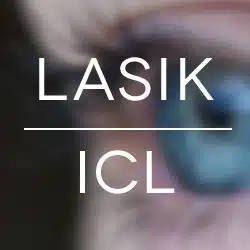 Many of our patients come to us asking about LASIK eye surgery to improve their vision. Since not everyone is a great candidate for LASIK, we then get questions about alternatives to the procedure.
Many of our patients come to us asking about LASIK eye surgery to improve their vision. Since not everyone is a great candidate for LASIK, we then get questions about alternatives to the procedure.
What is LASIK and ICL?
Laser-assisted in situ keratomileusis, also known as LASIK, is a popular vision correction procedure used to correct nearsightedness, farsightedness, and astigmatism. If you experience these vision problems, more than likely you depend on glasses or contacts to help you see clearly. The aim of a procedure like LASIK is to change the shape of the cornea so that light focuses more clearly on your retina. This allows you to see more clearly, often without the benefit of glasses or contact lenses.
Beyond LASIK, patients may consider Implantable Collamer Lens (ICL) Surgery. The biggest difference between LASIK and ICL is during ICL a special contact lens is implanted inside the eye and works with the eye’s natural lens to provide excellent quality of vision for a wide range of correction. This procedure may be ideal for patients who are not candidates for LASIK due to high levels of nearsightedness, or for patients who do not like the idea of permanently removing corneal tissue. Should your prescription change over time, the ICL is replaceable to maintain your vision options.
Both ICL and LASIK are excellent options for patients considering vision correction. We are committed to helping all of our patients determine the best surgery for their vision goals, whether it is LASIK or ICL.
Ideal Candidates
LASIK and ICL are generally considered vision correction solutions for adults between the ages of 18 and 45. The vision of children and adolescents is still changing naturally, so procedures like these are usually premature. To be good candidates for LASIK eye surgery, patients must:
- Be at least age 18
- Have a prescription for glasses or contacts that has not changed significantly in the past year
- Have good eye health and good general health
- Not being pregnant or nursing
- Not have a history of chronic dry eyes
During your consultation, we ask you additional questions and a doctor will conduct a thorough exam of your vision to determine if you are a candidate for LASIK surgery.
If during this consultation, patients are deemed not a candidate for LASIK, they may be given the option to consider theVisian ICL instead. Ideal ICL candidates are adults who:
- are aged 21-45
- have mild to severe myopia
- have a steady prescription
Preparing For Treatment
Once we have determined which procedure is best for you, we will conduct a pre-operative exam and preparation for the surgery.
For LASIK eye surgery, we dilate your eyes so we can obtain an exact measure of your current prescription. If you currently wear contact lenses, we will ask you to stop wearing them for a period of time prior to surgery (typically 72 hours), as contacts temporarily change the shape of your corneas.
What Happens During the Procedure?
For both implantable collamer lens and LASIK eye surgery, both eyes are typically done the same day and are outpatient procedures that take a very short amount of time, usually 30 minutes or less. The eyes are numbed with anesthetic drops and patients may be given a sedative, as well.
With LASIK, the surgeon uses a laser to create a thin flap in the corneal tissue to access the corneal tissue underneath. The laser then shapes the cornea to allow the light to fully focus on the retina. Our doctors use the Allegretto WaveLight laser, which is one of the fastest excimer laser systems available, combined with the Wavelight FS200 (the fastest laser in the world) to create the flap. The Allegretto technology is the only LASIK technology engineered to account for the natural shape of the cornea, preserving the quality of vision and addressing the spherical distortions that can induce glare and may affect night vision. Patients typically see better immediately after LASIK Surgery, however, the best results are noticed within seven to ten days post-operatively.
During the ICL procedure, the surgeon creates tiny micro incisions near the cornea to allow positioning of the lens between the iris and the natural lens. The surgeon carefully implants the lens through these micro-incisions, and the implant unfolds. Once the ICL is unfolded, the surgeon places the edges of the lens behind the iris, making it truly invisible. Patients are given eye drops to use at home for post-operative care. Patients who choose the ICL surgery typically see results within 24 hours postoperatively.
For patients having LASIK or ICL surgery, we strongly encourage you to have someone else drive you home, as your vision immediately after these procedures may be significantly impaired.
Recovery Time
The day following your LASIK or ICL surgery you come back for a post-operative exam. At this appointment, our doctors examine your eyes and test your vision refraction.
Although little to no recovery time is needed for LASIK or ICL, doctors recommend limiting your activity, avoiding swimming pools, or heavy exercise that may cause perspiration to drip into your eyes. You may feel some burning mild pain or grittiness in the eyes from the procedure. However, the discomfort should not be severe. While you may encounter some blurred vision after surgery, you should be able to see much more clearly by the second day. We recommend that you take a few days off work and stop any strenuous activities so that you can fully recover before you return to your normal, but clearer, life.
Risk of Complications
As with any surgical procedure, there are certain risks and possible complications. The experience of the surgeons of West Texas Eye Associates and staff, along with their commitment to providing state-of-the-art technology helps to minimize these risks. Most complications can be treated and the risk of vision loss is very low.
Deciding on Vision Correction
Your decision to have LASIK or ICL surgery could be one of the most important life-changing decisions you will make. At West Texas Eye Associates, we understand how important your vision is to you and are dedicated to providing you with excellence in eye care.
